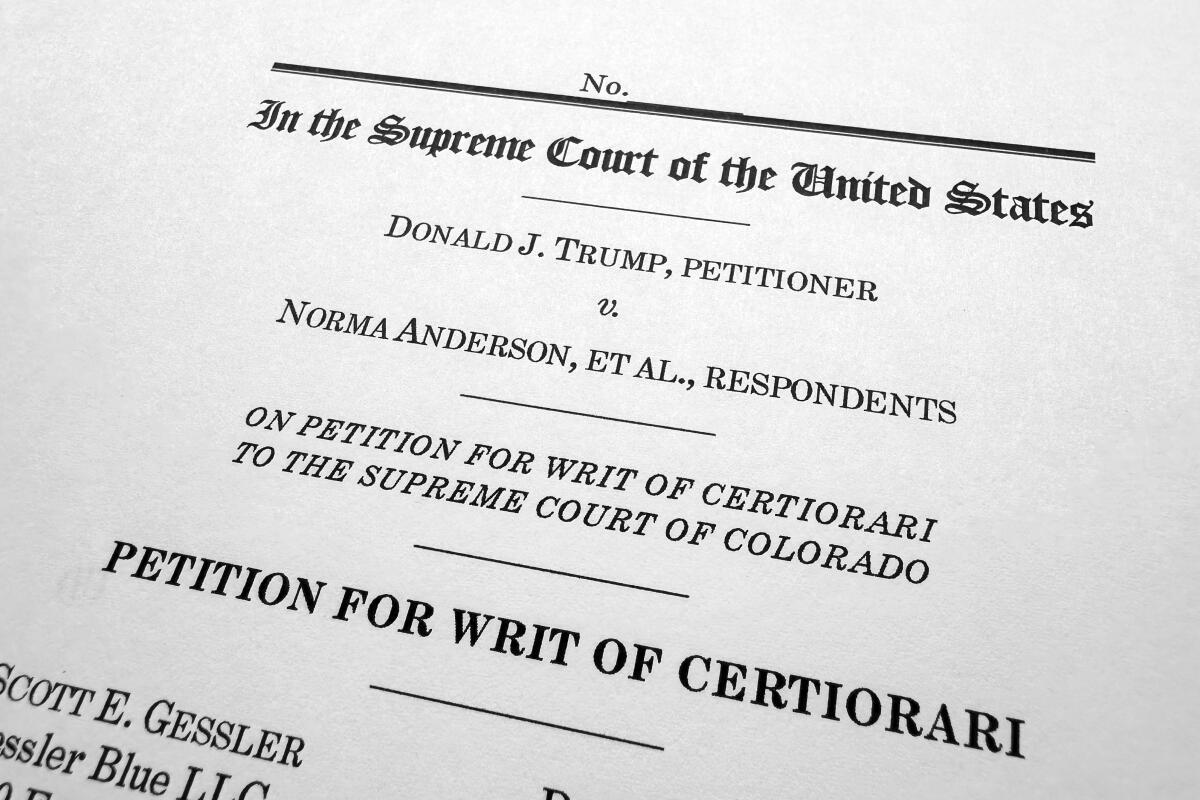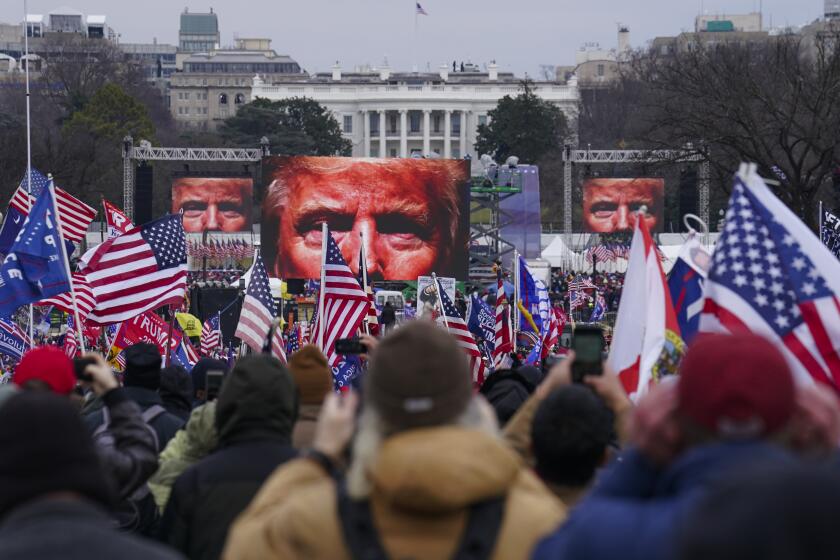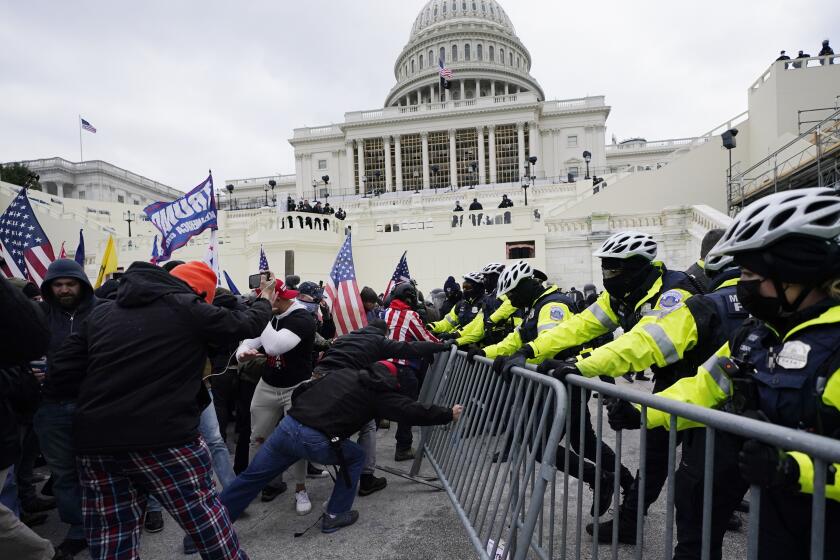Why the Supreme Court will probably put Trump back on the ballot in Colorado and nationwide

- Share via
More than any U.S. Supreme Court case in decades, former President Trump’s appeal of the Colorado decision disqualifying him from the state’s primary ballot combines huge political moment with a scarcity of guiding law. For the court, which announced last week that it would hear the case on a warp-speed schedule, that is a precarious combination that exposes it to accusations of political bias.
So how will the court rule? I think it will be loath to permit a patchwork result in which Trump appears on the ballot in some states but not in others. To avoid such a patchwork, a majority of the justices is likely to reverse the Colorado Supreme Court’s ruling that Trump engaged in insurrection and is therefore ineligible for office under the 14th Amendment. And the court will probably do so in a way that also prevents other states from removing the former president from the ballot.
Litman: A seismic Colorado court decision just upended Trump’s campaign. Here’s what comes next
The court disqualified the ex-president from the ballot under the 14th Amendment, which bars officials who engage in insurrection from holding federal office.
As the court arguably has in other landmark decisions, it may well act politically in the sense that it will be most concerned about the practical result. That’s different from saying that the decision will break down along party lines. A nakedly partisan outcome akin to the Bush vs. Gore opinion would be a disaster for the court’s already diminished reputation.
The majority could well consist of those most likely to share Chief Justice John G. Roberts Jr.’s concern for the court’s standing and hesitation to intrude on the election. Such a majority would be more likely to include justices open to institutionalist arguments, such as Elena Kagan and Brett M. Kavanaugh, than far-right rebels Samuel J. Alito Jr. and Clarence Thomas. That kind of coalition might favor a rationale that is less than pristine but serves broader social and political goals.
An early sign of such a consensus is the court’s unanimous order accepting the case and setting an expedited timetable, with oral argument scheduled in a month. The later the court acts, the more intrusive and controversial its role will be.
Judge Sarah B. Wallace’s opinion makes the crucial finding that the then-president engaged in insurrection on Jan. 6, 2021, which could disqualify him from office.
The court also preserved maximum flexibility in taking the case. Instead of considering the limited legal questions presented by the Colorado Republican Party or the challengers to Trump’s qualification for the ballot, the justices accepted Trump’s broader question. That means that any of the seven or so bases for reversal set out in Trump’s petition are fair game.
It’s difficult at this point to imagine the court upholding the Colorado opinion and thereby also allowing each state to make its own determination as to whether the Republican front-runner appears on the ballot. I don’t think such an arrangement would be unconstitutional, but it would be an ugly outcome that would be laid directly at the court’s feet.
The Constitution does accord a significant role to the states in electing the president, so much so that the winner of the national popular vote has lost two of the last six elections. I don’t think the framers would have been bothered by the prospect of different states having different candidates on their presidential ballots. But they didn’t anticipate a national two-party system either.
In 2024, the social, cultural and political fact is that the presidential election is a fully national contest that will play out according to quaint and obscure state rules. For one of the two major-party candidates to be missing from some state ballots and not others could encourage even more Americans to refuse to recognize the election’s legitimacy. I think the court would regard that as abhorrent.
Moreover, it would be virtually impossible for the court to devise a one-size-fits-all solution that bans Trump from the ballot in every state. The court is not a fact-finding body, and this case doesn’t begin to present the sort of record from which it could conclude that Trump “engaged in insurrection” under Section 3 of the 14th Amendment. The justices could find that Colorado’s determination was not in error under federal law, but that’s a far cry from ensuring the same result in every other state.
That’s why a majority of the justices is more likely to reverse the Colorado Supreme Court under a principle of federal law that also shuts down parallel efforts to remove Trump from the ballot in Maine, Massachusetts, Illinois and other states.
Trump’s petition provides the justices with several means of doing so, from finding fault with the Colorado court’s definition of “insurrection” to determining that the president is not an “officer” of the United States. All these means of reversing the Colorado decision have significant flaws. But given the political, legal and practical considerations before the court, I believe it will settle on one of them to avoid even messier consequences.
Harry Litman is the host of the “Talking Feds” podcast. @harrylitman
More to Read
A cure for the common opinion
Get thought-provoking perspectives with our weekly newsletter.
You may occasionally receive promotional content from the Los Angeles Times.












